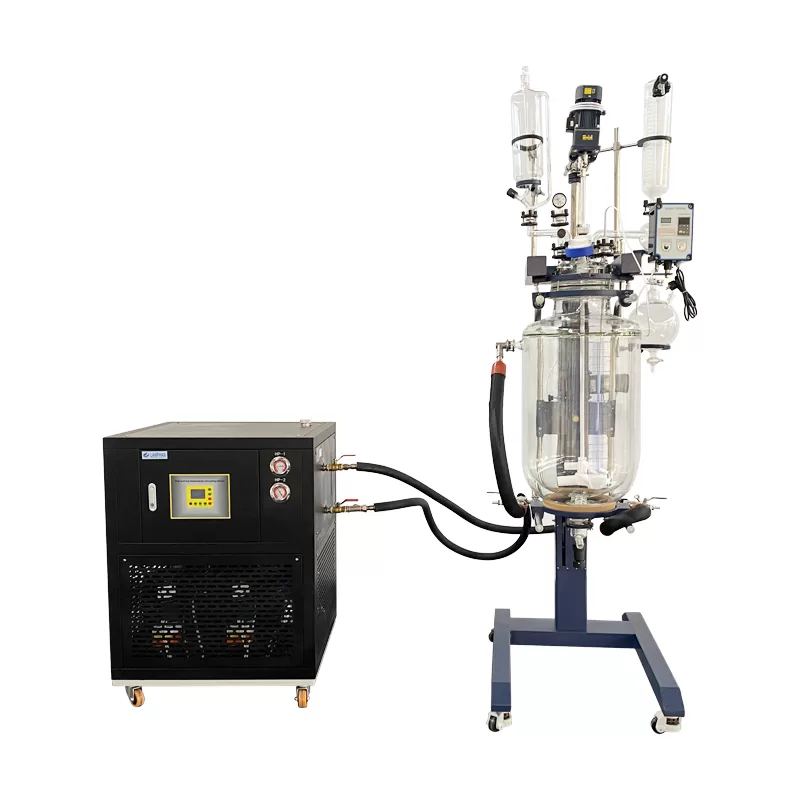Application of Glass Lift Reactor
The glass lift reactor is mainly used for material synthesis, distillation, concentration and other experiments, and is widely used in pharmaceuticals, petrochemicals, biology, new energy, electronic semiconductors, scientific research units and other fields. The glass lift reaction kettle can be used with other devices to reflect the temperature value, acidity value, viscosity value (torque), stirring speed value and paragraph programming control of the reaction material in real time.
Feature of Glass Lift Reactor
The kettle body can be raised and lowered manually, which is convenient for feeding and taking out bulk crystals. It can be rotated 0~360° ; easy to clean.
New design, more stable operation.
The sealing method of flange connection; no vacuum grease sealing; good sealing; high vacuum.
The drugs in the kettle are fully mixed and reacted, which is convenient for cleaning and prevents cross-contamination of drugs.
The glass interface is sealed with a flange to avoid the phenomenon that the vacuum silicone grease seal is difficult to open;
YHGF-2 series rotary lift double-layer glass reactor is connected with full flange interface, which can withstand positive pressure up to 0.03Mpa.
Structure of Glass Lift Reactor
Reactor Volume: 100L
Reactor Sheft: a lift shelf
Speed: digital display speed
Vacuum Unit: a vacuum gauge
Kettle Lifting and Rotating Unit
Stirring Unit: paddle stirring, double-layer paddle
Temperature Control Unit: digital display temperature
Liquid Feeding and Liquid Dripping Unit: a constant pressure funnel, a solid feeding valve
Kettle Cover: constant pressure funnel #40 solid feeding #90 thermometer #29 suction valve #40 reflux elbow #50 stirring button #50
Other Special Custom Units
Details of Glass Lift Reactor
Reactor
Jacketed Reactor: high borosilicate glass (GG17) material
Working Volume: 10L
Split Lower Discharge Valve
Kettle Cover: can be installed with stirrer, constant pressure dropping funnel, reflux condenser, temperature sensor, solid feeding, liquid feeding, etc.
The kettle cover and the kettle body are connected by handwheel lifting and extrusion type sealing.
All parts in contact with liquid are made of borosilicate glass or PTFE, which has excellent corrosion resistance.
The design of parallel steel base makes the fuselage run more stably. This unit is equipped with casters for easy mobility.
The entire system can be moved simultaneously, ensuring stability and flexibility.
Stirring
The overhead mixing system ensures the stability of the whole set of equipment.
Double sealed bearings ensure high sealing of the system.
Available in glass, stainless steel, and PTFE-coated fluorine
The stirring paddle is made of PTFE and double-layer stirring. The stirring paddle can be replaced according to the experimental requirements.
Vacuum
Various models of vacuum pumps and pressure pumps are available.
Diaphragm vacuum pump
Rotary Vane Oil Sealed Vacuum Pump
Circulating water type multi-purpose vacuum pump
Temperature Control
Display stirring speed; frequency conversion; constant speed stirring; stable operation.
YHGF-2 series rotary lift double-layer glass reaction kettle can be equipped with ZN intelligent biochemical reaction device produced by our company, which can reflect the temperature value, acidity value, viscosity value (torque), stirring speed value and paragraph programming control of the reaction material in real time; Control the speed and time of the feeding pump; connect with the computer to realize the functions of remote real-time data acquisition, control, recording and curve drawing.
Parameter of Glass Lift Reactor
| Model | YHGF-10L | YHGF-20L | YHGF-30L | YHGF-50L | YHGF-100L | YHGF-150L |
| Constant Pressure Funnel (L) | 1 | 1 | 2 | 2 | 2 | 5 |
| Condensing Area (㎡) | 0.2 | 0.2 | 0.3 | 0.3 | 0.6 | 0.6 |
| Collecting Flask (L) | / | 3 | 3 | 3 | 5 | 5 |
| Bottom Valve Height (mm) | 350 | 450 | 450 | 500 | 500 | 650 |
| Reactor Material | Made of GG-17 high borosilicate glass, thickness ≥5mm | |||||
| Rotating Speed (r/min) | 0-650 | |||||
| Explosion-proof Motor Power (W) | 120 | 180 | 180 | 180 | 370 | 550 |
| Normal Motor Power (W) | 120 | 120 | 200 | 200 | 200 | 400 |

